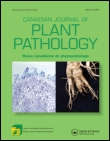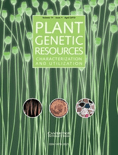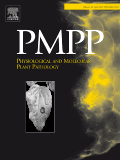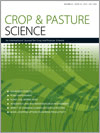
Tropical Plant Pathology
Scope & Guideline
Transforming agricultural practices through research.
Introduction
Aims and Scopes
- Plant Pathogen Characterization:
Research on the identification, classification, and genetic analysis of various pathogens including bacteria, fungi, viruses, and nematodes affecting tropical crops. - Disease Management Strategies:
Studies exploring integrated disease management approaches, including chemical, biological, and cultural practices to control plant diseases. - Genetic Resistance and Breeding:
Investigation into the genetic basis of resistance in crops against specific pathogens and the development of resistant varieties through breeding programs. - Epidemiology and Disease Dynamics:
Research focusing on the spread and impact of plant diseases within agricultural systems, including environmental and climatic influences. - Innovative Diagnostic Techniques:
Development and validation of new diagnostic tools and methodologies for the rapid detection and quantification of plant pathogens. - Biocontrol and Sustainable Practices:
Studies on the use of biological control agents and sustainable agricultural practices to mitigate the impact of plant diseases.
Trending and Emerging
- Molecular and Genomic Approaches:
There is an increasing trend in the use of molecular techniques for the characterization of pathogens and understanding disease mechanisms, facilitating more precise interventions. - Biological Control and Eco-friendly Practices:
Research focusing on the use of biocontrol agents and sustainable agricultural practices is gaining momentum as the agricultural community seeks environmentally friendly disease management solutions. - Resilience to Climate Change:
Emerging studies are addressing how plant diseases are influenced by climate change, emphasizing the need for adaptive management strategies in tropical agriculture. - Machine Learning and AI in Plant Pathology:
The integration of artificial intelligence and machine learning for disease detection and management is a rapidly growing area, showcasing innovations in data analysis and decision-making. - Diversity and Evolution of Plant Pathogens:
Research on the evolutionary dynamics and diversity of plant pathogens, including their adaptation to hosts and environments, is becoming increasingly prominent.
Declining or Waning
- Traditional Chemical Control Methods:
Research focused on conventional chemical fungicides and pesticides is decreasing as the field shifts towards integrated and sustainable management practices. - Host-Specific Pathogen Interactions:
Studies concentrating solely on host-pathogen interactions without considering broader ecological or environmental contexts are becoming less common, as more holistic approaches gain traction. - Generalized Resistance Mechanisms:
Publications centered on broad resistance mechanisms without specific applications to crop breeding or management strategies are declining, reflecting a shift towards more targeted research.
Similar Journals

CANADIAN JOURNAL OF PLANT PATHOLOGY
Fostering innovation in the realm of plant health and pathology.Canadian Journal of Plant Pathology, published by Taylor & Francis Inc, is a leading academic journal dedicated to advancing the field of plant pathology, with a significant focus on the interplay between plant health and environmental factors. Established in 1979, this journal has established a reputation for high-quality research, currently holding a commendable impact factor within its category. As of 2023, it ranks in the Q2 quartile for both Agronomy and Crop Science as well as Plant Science, highlighting its importance and influence in these domains. With an impressive ranking of 142/516 in Plant Science and 115/406 in Agronomy and Crop Science according to Scopus, the journal is positioned within the 72nd and 71st percentiles, respectively. The Canadian Journal of Plant Pathology serves as a vital platform for researchers, professionals, and students aiming to contribute to the understanding of plant diseases, fostering innovation and development in agricultural practices.

GENETIC RESOURCES AND CROP EVOLUTION
Exploring Genetic Frontiers for Sustainable AgricultureGENETIC RESOURCES AND CROP EVOLUTION is a leading academic journal dedicated to the exploration and advancement of genetic resources in agriculture, evolutionary biology, and plant science. Published by Springer in the Netherlands since 1992, this journal aims to foster a greater understanding of the genetic basis of crop evolution and diversity. With a robust impact reflected in its Q2 status in multiple categories, including Agronomy, Ecology, and Plant Science, it ranks impressively within the top quartiles of its fields. As of 2023, it continues to be an essential resource for researchers, professionals, and students who seek to enhance sustainable crop production and biodiversity conservation through innovative genetic methodologies. The journal promotes high-quality, peer-reviewed research that contributes valuable insights into the genetic adaptation of crops in response to environmental changes. While the journal is not open access, its esteemed reputation ensures that the insights it provides reach a wide audience eager to address some of today's most pressing agricultural challenges.

JOURNAL OF GENERAL PLANT PATHOLOGY
Empowering Researchers with Cutting-Edge FindingsJOURNAL OF GENERAL PLANT PATHOLOGY, published by SPRINGER JAPAN KK, is a pivotal platform dedicated to the dissemination of high-quality research in the fields of agronomy and crop science, as well as plant pathology. With an ISSN of 1345-2630 and an E-ISSN of 1610-739X, this journal plays a significant role in advancing our understanding of plant diseases and their management, particularly within the context of sustainable agriculture. Currently ranking in the Q3 quartile for both Agronomy and Crop Science as well as Plant Science, it showcases a diverse array of articles that encompass fundamental research, innovative methodologies, and practical applications to address contemporary challenges in these fields. Researchers and professionals seeking to enhance their knowledge and stay abreast of the latest findings will find the JOURNAL OF GENERAL PLANT PATHOLOGY an invaluable resource. Operating without Open Access, it still ensures wide accessibility through institutional subscriptions and comprehensive digital archiving, with a commitment to excellence from its inception in 2001 through its ongoing developments into 2024.

PLANT PROTECTION SCIENCE
Empowering plant protection for a greener future.PLANT PROTECTION SCIENCE, published by the Czech Academy Agricultural Sciences, is an esteemed journal dedicated to advancing the field of agronomy, crop science, and soil science. With a strong open access policy since 2007, this journal has made significant contributions to the dissemination of research relevant to plant protection, sustainable agriculture, and environmental preservation. Operating from Prague, Czech Republic, it has successfully positioned itself within the Q2 category in Agronomy and Crop Science and Q3 in Soil Science as of 2023, highlighting its relevance and influence in these vital areas of agricultural research. According to Scopus, its rankings reflect a respectable standing, with percentile ranks of 58th in Agronomy and Crop Science and 53rd in Soil Science. Researchers, professionals, and students are encouraged to explore its rich repository of peer-reviewed articles, which aim to address critical challenges in plant health and production, thereby fostering innovation in agricultural practices.

Plant Genetic Resources-Characterization and Utilization
Exploring Genetic Treasures for Tomorrow's CropsPlant Genetic Resources-Characterization and Utilization, published by Cambridge University Press, is an esteemed journal in the field of plant science, particularly focusing on the genetic resources crucial for agriculture and crop improvement. With an ISSN of 1479-2621 and an E-ISSN of 1479-263X, this journal serves as a vital platform for researchers aiming to advance the understanding of genetic variation and its applications in plant breeding and conservation. The journal boasts an impressive positioning within its categories, achieving Q2 in Agronomy and Crop Science, Q4 in Genetics, and Q3 in Plant Science as of 2023, which reflects its commitment to publishing high-quality research. Although primarily subscription-based, the journal is accessible to institutions and individuals seeking to stay at the forefront of innovations in plant genetic resources. Researchers, professionals, and students alike will find valuable insights into the latest methodologies, findings, and implications for sustainable agriculture and ecosystem management in its pages. As a key resource for advancing knowledge and practical applications in its field, Plant Genetic Resources-Characterization and Utilization continues to significantly contribute to the scientific community and the understanding of plant biodiversity.

ARCHIVES OF PHYTOPATHOLOGY AND PLANT PROTECTION
Advancing Agricultural Solutions through Rigorous ResearchArchives of Phytopathology and Plant Protection, published by Taylor & Francis Ltd, stands as a pivotal platform in the field of agronomy and crop science since its inception in 1974. With an ISSN of 0323-5408 and E-ISSN of 1477-2906, this journal is dedicated to publishing high-quality, peer-reviewed research that addresses contemporary challenges in plant pathology and protection. As a Q3 ranked journal in its category with Scopus Rank #210/406, it serves a vital role in disseminating practical solutions and innovative discoveries to enhance agricultural productivity and sustainability. The journal fosters a rich exchange of ideas among researchers, professionals, and students, empowering them to contribute to the advancement of the agronomy and biological sciences. Despite being traditionally subscription-based, the journal's commitment to comprehensive and rigorous research makes it an essential resource for anyone invested in the future of plant health and agricultural innovation.

JOURNAL OF PLANT PATHOLOGY
Exploring Innovations in PhytopathologyJOURNAL OF PLANT PATHOLOGY, published by SPRINGER, is a premier academic journal dedicated to advancing the understanding of phytopathology and related fields. With a strong international presence and an impact factor that reflects its influence in the scientific community, this journal offers essential insights to researchers, professionals, and students engaged in plant health. Since its inception in 1997, it has consistently provided a platform for innovative research, contributing to the Q2 rank in Plant Science as per the 2023 category quartiles. The journal covers a broad spectrum of topics related to plant diseases, their management, and the ecological impacts they pose, ensuring relevance to contemporary challenges in agriculture and sustainability. While the journal does not currently offer Open Access options, it remains a crucial resource for those looking to deepen their knowledge and bolster their research endeavors in the vital area of plant pathology.

JOURNAL OF PHYTOPATHOLOGY
Connecting researchers to enhance global plant health.JOURNAL OF PHYTOPATHOLOGY, published by Wiley, stands as a premier platform for disseminating cutting-edge research in the field of plant health, emphasizing the interactions between plants and pathogens. Since its inception in 1958, the journal has fostered a rich legacy of advancing scientific knowledge and understanding in areas encompassing Agronomy, Crop Science, Genetics, and Plant Physiology. With its notable impact factor and respectable positions in respective Scopus ranks, including Q2 in Agronomy and Crop Science, JOURNAL OF PHYTOPATHOLOGY is essential for researchers, professionals, and students dedicated to understanding and overcoming plant-related challenges. Although it operates under a traditional subscription model, the journal’s contributions remain crucial for anyone involved in plant science and pathology, making it an invaluable resource for enhancing agricultural productivity and sustainability. The journal’s commitment to excellence continues to inspire innovative research and informative discussions among the global scientific community.

PHYSIOLOGICAL AND MOLECULAR PLANT PATHOLOGY
Innovating solutions for a sustainable agricultural future.Physiological and Molecular Plant Pathology is a leading journal published by Academic Press Ltd - Elsevier Science Ltd, dedicated to advancing our understanding of plant diseases through the synthesis of physiological and molecular perspectives. With an ISSN of 0885-5765, this esteemed journal has been a cornerstone in the field since its inception in 1986 and continues to publish critical research findings up to 2024. Notably, it holds a strong reputation in Plant Science, ranked Q2, and genetics, ranked Q3, reflecting its impactful contributions to these important areas of study. The journal is recognized within Scopus, achieving a ranking of 151 out of 516 in Plant Science, positioning it within the 70th percentile, making it a vital resource for researchers and students alike. While it is not an open-access journal, the insights provided in each issue are invaluable for those dedicated to understanding the complexities of plant pathology and enhancing agricultural resilience. Researchers, professionals, and students in the field are encouraged to explore and contribute to this pivotal journal, which plays a crucial role in driving innovation and discovery in plant health sciences.

Crop & Pasture Science
Connecting global minds in crop and pasture science.Crop & Pasture Science is a leading journal published by CSIRO PUBLISHING, focusing on the critical fields of agronomy, crop science, and plant science. With an impressive Q2 ranking in both categories as of 2023, this journal plays a vital role in disseminating high-quality research that addresses the challenges in sustainable agriculture and food security. Featuring full open-access options, Crop & Pasture Science ensures your research reaches a wide audience, fostering collaboration and innovation among ecologists, agronomists, and plant scientists. With a steady record of contributions since its establishment and a convergence of knowledge from 2009 to 2024, this journal stands at the forefront of the agricultural sciences, providing a robust platform for the latest advancements and discoveries. Located in Australia, the journal serves a global community, making it an essential resource for anyone invested in the future of agriculture and environmental sustainability.